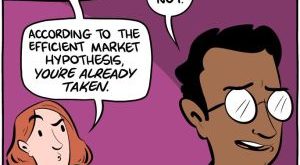from Lars Syll Let’s be honest: no one knows what is happening in the world economy today … Policymakers don’t know what to do. They press the usual (and unusual) levers and nothing happens. Quantitative easing was supposed to bring inflation “back to target.” It didn’t. Fiscal contraction was supposed to restore confidence. It didn’t … Most economics students are not required to study psychology, philosophy, history, or politics. They are spoon-fed models of the economy, based on unreal...
Read More »Christmas eve, 1717
Source On 24 December 1717, three hundred years ago today, a northwesterly storm hit the coasts of North Europe. About 14.000 died, over 2.000 of these in the Dutch province of Groningen but only 150 in neighboring Friesland. Why this difference? We do know the answer: Friesland had better coastal defences. Frisian ‘dijken’ were better designed, higher and, especially, better maintained than in Groningen. As Frisian public governance of these public goods was better. In 1716, the...
Read More »The European Commission on how (not) to change the Eurozone
Previous posts in this series on central banking: ideas of Willem Buiter, Richard Werner, Thomas Mayer, excerpts from a recent paper by Mike Konczal and Josh Mason, Edward Harris and ideas from the German Handelsblatt shadow council. Today: the European Commission. Why? A lot of people want to change (European) monetary policy and central banking. This includes the members of the European Commission. They want 2 things: A larger Eurozone Some kind of ‘transfer’ union which somehow...
Read More »My philosophy of economics
from Lars Syll A critique yours truly sometimes encounters is that as long as I cannot come up with some own alternative to the failing mainstream theory, I shouldn’t expect people to pay attention. This is, however, to totally and utterly misunderstand the role of philosophy and methodology of economics! As John Locke wrote in An Essay Concerning Human Understanding: The Commonwealth of Learning is not at this time without Master-Builders, whose mighty Designs, in advancing the...
Read More »Tax Rates v. Real GDP Growth Rates
by Mike Kimel (from 2012) Tax Rates v. Real GDP Growth Rates, a Scatter Plot This post was submitted by Kaleberg. In this post, I will look at the relationship between top marginal income tax rates and real GDP growth using a scatter plot. I am inordinately fond of scatter plots. The nice thing about a scatter plot is that you can present a lot of data in a fairly small space, so rather than just comparing tax rates at time period t against real GDP...
Read More »issue 82 of the real-world economics review
real-world economics reviewIssue no. 82 download whole issue China’s drivers and planetary ecological collapse 2Richard Smith download pdf The Saudi Palace coup, the oil market, China and the United States 29Ali Kadri download pdf Teaching relevant microeconomics after the global financial crisis 47Michel S. Zouboulakis download pdf On microfoundations of macroeconomics 60Prabhath Jayasingh download pdf The trouble...
Read More »Highs and Lows of 2017 – for CLASS
2017 will of course be remembered as Year 1 of a deceitful, authoritarian, racist, misogynous US President. But it is also inspirational for a global women’s uprising, launched in the UK with the London Women’s March in January.The economic surprises of 2017 were the strength of the global cyclical upturn including in the Eurozone (but whose deeper flaws will resurface in the next sharp downturn). Only the UK economy lagged behind – though maybe not as far as many Remainers expected.A...
Read More »Keynes’ intellectual revolution
from Lars Syll Keynes’ General Theory is both a critique and a replacement of classical macroeconomic theory. Both are necessary for an intellectual revolution. On one hand, it is a critique and demolition of classical macroeconomics. On the other hand, it offers a novel alternative theory of the workings of a modern industrial capitalist economy … Keynes’ argument involves sweeping away old theory and introducing new theory. First, Keynes rejected the loanable funds theory of interest...
Read More »WTO, price crops and global hunger
from Maria Alejandra Madi Current food challenges involve issues ranging from land and food access to commodity price volatility, besides national and international regulation. Although the scope and intensity of these challenges vary according to the different economic and social situations of countries, the debate has been global. Today, once again, these issues arise deep concerns on behalf of the 2017 WTO ministerial conference that has just been closed, in Buenos Aires, Argentina....
Read More »The Efficient Markets Hypothesis
from Lars Syll The really interesting questions about the Efficient Markets Hypothesis — at least when discussed by mainstream economists — usually drown in “the model is the message” pseudoscientific mumbo-jumbo of four-factor models with two mispricing factors being better-performing than three-factor models, blah, blah, blah … Diane Coyle has a much more accurate view of what it’s all about: I would defend using the assumption of rational choice as long as one realises that it is not a...
Read More » Heterodox
Heterodox





